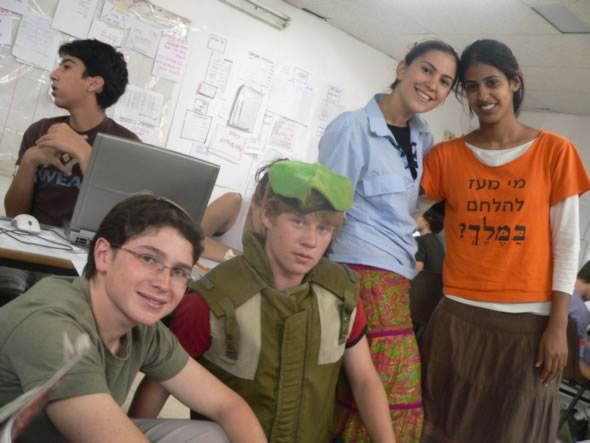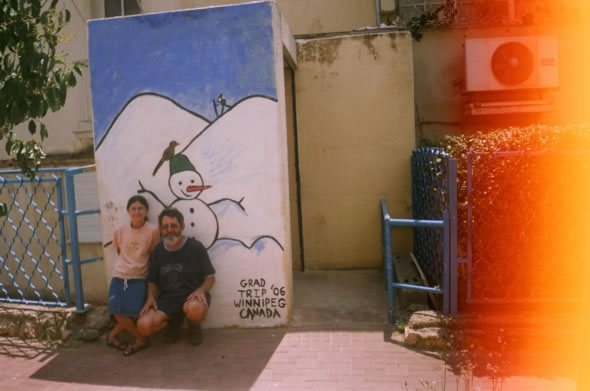|
Live from Kiriat Shmona
By Barry Silverberg
August 17, 2006: It's a bright sunny day in Kiriat Shmona; we're onto a major heat wave, heading towards 40 degrees Centigrade (104 degrees Fahrenheit), but the town is bustling. The majority of the 17,000 residents who left during the bombing are back; they're setting their houses in order, those who still have houses. Many are dealing with estimates, contractors, and the property tax people who will eventually reimburse them for most of the damage. Glaziers and aluminum window people are working around the clock as people replace shattered windows and rib them about giving kickbacks to Nasrallah. On the third day of the 'cease fire agreement' the Home Front Command announces a full return to routine life in all parts of Israel.
I'm off to get my car into an electrician; something which I couldn't do for five weeks and had to travel a thousand kilometers with only one speaker. How we suffer in wartime! And I'm wondering if anyone in Western Canada will care about what I write, as the Northern border war is passé.
And the siren wails.
And all along the street, people either fall apart, run for a shelter, or just keep on walking with a rueful laugh.
I stop and walk quickly into the nearest building. I can tell who are the people who just returned and I explain what to do. The siren only came into use three weeks ago; we never had one in all the 30 years of rockets. For years, we had an announcement for emergencies that sounded exactly like department store paging: Except one hundred and fifty times louder: DING dong!!!!! Christeen, Christeen, lingerie desk! Except we hear the same voice saying: Ding dong!!! All citizens, go into your shelters or security rooms. But these warnings had little to do with the Katyushas (missiles) actually falling. The siren, on the other hand means business, as it's tied in to the National Defense Radar System. If a rocket falls on you a minute before the siren, there's not much you can do. But if you've waited for five minutes or so, it's safe to move. Probably.
The minutes pass; no explosions. I offer a lift to a startled woman and then continue on my way. Maybe it was just a false alarm. But the message is clear: We're 'back to normal' but this war is far from over.
The following are Frequently Asked Questions that we hear from outsiders and news people:
WHY DID YOUR FAMILY STAY IN KIRIAT SHMONA?
The straight answer is that my wife Masha is a school psychologist for the city. During times of emergency, the psychologists are expected to report to work.
There is always a psychologist or school counselor on duty at the 'HAMMAL,' the communal volunteer centre, and psychologists visit shelters to deal with emergency situations which arise.
DO PSYCHOLOGISTS AND OTHER PROFESSIONAL VOLUNTEERS RECEIVE PROTECTIVE CLOTHING WHEN MOVING FROM PLACE TO PLACE?
Not really. The army, electric company workers, and the police get flak jackets and helmets. But most of the volunteers scorn such frippery. I have a flak jacket that says Kiriat Shmona on it; I took it from a pile six years ago and I used it when I went outside during rough hours.
WAS IT FAIR TO SUBJECT YOUR KIDS TO SUCH DANGER?
We did not force our kids to stay. They all have lots of friends outside the danger zone who invited them to stay over. In fact, each of them spent several days away as guests. But they always preferred to return. Having the family together, for a late, hastily cooked dinner and a midnight TV show in the shelter was extremely important for my wife Masha whose work is extremely stressful and for the rest of us as well.
WHAT DO KIDS DO IN SUCH AN EMERGENCY? WATCH TV ALL DAY?
Not at all! Elisheva (17) and Yisrael (15) were part of a team that answered phones in the HAMMAL HQ, dealing with the varied needs and problems of the families who remained in shelters, or who appeared in person, often distraught or angry. My youngest, Miriam (11) helped me deliver food and supplies to people stuck in shelters and security rooms.

Yisrael Silverberg, (seated, L) 15 poses in the community centre shelter where he volunteered his time for most of the war, with other volunteers from various backgrounds. Note the detailed program for the week ahead on the wall.
WHAT PROBLEMS, FOR EXAMPLE DID THE KIDS DEAL WITH?
Someone might need a particular type of medicine or food. People had no money, no way of doing shopping. There were family squabbles. Families with disabled, elderly or mentally ill members all had special needs. The volunteers on the phones had to be caring but firm, and up to date on all the services and supplies that were available in town. If a plan arose to take several hundred people to hotels for a week, hundreds of phone calls and endless preparations were necessary. New volunteers, young and old, from all sectors of society poured in, offering to help. They had to be placed, fed, housed and cared for.
AS A WINNIPEGER, WHAT WAS YOUR MOST MOVING MOMENT FROM THE WAR:
Two weeks ago I was delivering food and supplies in a low income neighborhood. We stopped in front of a house where a Lebanese family lives. (At least one hundred Lebanese Christians live in Kiriat Shmona. Until forced to flee their homes when the Israelis retreated from Lebanon in May, 2000, they were part of a fighting force that worked side by side with the IDF. ) As we swelter under the hot sun, with the imminent threat of Katyushas very real, as noon is peak rocket time, we see a mural painted on the wall only a few months ago:

You can reach Barry at: barisil@netvision.net.il. To read more articles about life in Kiriat Shmona, teaching English in Israel and much more, try http://www.etni.org/teachers/barry/barry.htm.
~~~~~~~
from the September 2006 Edition of the Jewish Magazine
|










